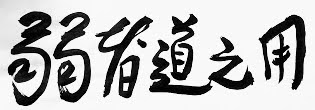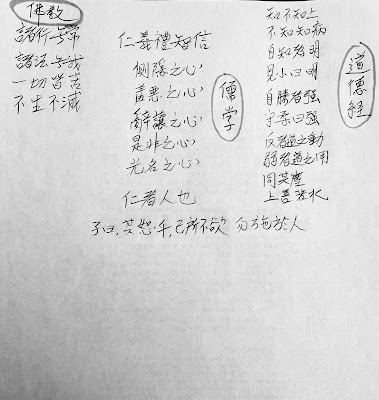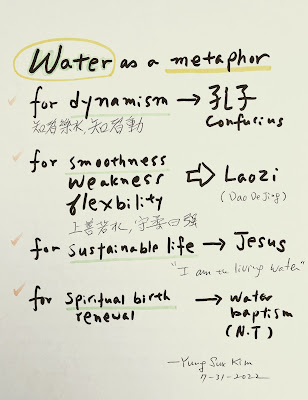Ancient Asian Philosophy and Literature
Confucianism/Confucian Texts
Analects (Charles Muller)
Analects (D.C. Lau)
Resources for the AnalectsKEY PHRASES from the AnalectsAnalects 6:23: "The knowing person likes water; the humane person likes mountains. The former is advancing and exciting, and the latter is calm."
11:12: "Chi Lu asked about serving spirits. Kongzi (Confucius) said: "If you cannot serve people yet, how can you serve the spirits?" Chi Lu said, "May I ask about death?" Kongzi said, "If you do not understand life, how can you understand death?"
13:23: "The most profound person (lord's son, kunzi) seeks harmony, but maintains differences. The small person is aligned with others (crowds), but does not seek harmony."
15:24: "Zi Gong asked: “Tell us with one word as to how we can live during our whole life?" Kongzi said, 'Isn't it reciprocity?' Do not impose on others what you do not want for yourself."
"The noble person seeks harmony while remaining distinct from others. In contrast, the small person desires uniformity without achieving true harmony." (Analects 13:23, trans. by Yung Suk Kim)
My commentary:
The wise individual pursues harmony or coexistence while remaining unique. Such a person embraces diversity while maintaining authenticity and striving for a greater community. On the other hand, the petty individual conforms to the majority without considering the importance of achieving deeper harmony.
Ren” is a key term in the Analects.
My posts:
Confucius's golden rule:
子貢問曰。有一言而可以終身行之者乎。子曰。其恕乎。己所不欲、勿施於人。
SIMPLE TRUTH:
-Jesus: “In everything do to others as you would have them do to you, for this is the Law and the Prophets" (Golden Rule, Matt 7:12).
-Hillel: "What is hateful to you, do not do to others. This is the whole Torah, and the rest is commentary" (Talmud Shabbat 31a).
-Confucius: Zi Gong asked: “What is the single word that we can take as a moral guide for our whole life?” Confucius said, “Is it not reciprocity? What you don't desire don't impose on others.” (Analects 15:24).
HUMAN-CENTERED THOUGHT:
-Jesus: “The Sabbath was made for humankind and not humankind for the Sabbath" (Mark 2:28).
-Confucius: The person unfolds the way; it is not the way that unfolds the person" (Analects 15:29).
Five Analects of Confucius (source):
“Respect yourself and others will respect you.”
“Hold faithfulness and sincerity as first principles.”
“To be wealthy and honored in an unjust society is a disgrace.”
“Never give a sword to a man who can't dance.”
“The noble-minded are calm and steady."
“Respect yourself and others will respect you.”
“Hold faithfulness and sincerity as first principles.”
“To be wealthy and honored in an unjust society is a disgrace.”
“Never give a sword to a man who can't dance.”
“The noble-minded are calm and steady."
Four Books
Great Learning (or alternative)
The Doctrine of the Mean (or Alternative)
Analects (or alternative)
Mencius (or alternative)
In the Doctrine of the Mean (one of the Four Books of Confucianism), there is an important phrase that represents Confucius's main thought: 仁者人也 (rén zhě rén yě). See the following calligraphy I wrote. This phrase may be translated as "To love is to become the person." By the way, love (Ren in Chinese: 仁) appears frequently, 106 times, in the Analects of Confucius. The question is: What is Ren or love according to Confucius or how do we interpret it?
Five Classics: Classics of Poetry, Book of Documents, Book of Change, Book of Rites, and Spring and Autumn Annals.
사서는 논어(論語), 맹자(孟子), 대학(大學), 중용(中庸); 삼경은 시경(詩經), 서경(書痙), 주역(周易); 춘추(春秋)와 예기(禮記)를 포함하면 오경이다.
Five behaviors of the person according to Analects: "benevolence (ren 仁), righteousness (yi 義), ritual propriety (li 禮), wisdom (zhi 智), and trustworthiness (xin 信)" (Stanford Encyclopedia of Philosophy).
*맹자의 사단:
측은지심(惻隱之心) : 측은히 여기는 마음
수오지심(羞惡之心) : 부끄러워 하고 미워하는 마음
사양지심(辭讓之心) : 사양할 줄 아는 마음
시비지심(是非之心) : 옳고 그름을 판단하는 마음
수오지심(羞惡之心) : 부끄러워 하고 미워하는 마음
사양지심(辭讓之心) : 사양할 줄 아는 마음
시비지심(是非之心) : 옳고 그름을 판단하는 마음
From Mencius
[13-25] 子曰。君子易事而難說也。說之不以道、不說也。及其使人也、器之。小人難事而易說也。說之雖不以道、說也。及其使人也、求備焉。
Analects 13:25: The Master said: "A noble person is easy to work for but difficult to satisfy. If you try to win their approval through questionable methods, they will not be pleased. When they assign tasks to others, they do so according to each person's abilities. In contrast, an inferior person is difficult to work for but easy to please. Even if you resort to deceitful tactics to make them happy, they will still be satisfied. When hiring others, they tend to exploit their workers to the fullest extent possible" (trans. by Yung Suk Kim). Laozi/Dao De Jing
Dao De Jing is a classical wisdom book, purportedly written by Laozi. It comprises 81 short poems and is one of the most-read books in the world today.
Free access
[from Amazon]
Dao De Jing is similar to Jesus's parables in some ways. I wrote a book about it: Reading Jesus' Parables with Dao De Jing.
"The Way of Heaven lowers what is excessive and supplements what is insufficient. The way of humans is not so; it lowers what is insufficient and increases what is excessive." (Dao De Jing 77).
"To see small is enlightenment" --Dao De Jing 52
A MIX OF Buddhist and Dao texts
Summary of Three Big Traditions
Buddhist Philosophy
-Mahayana Buddhism focuses on human salvation or nirvana; text-centered teaching.
-Hinayana Buddhism focuses on individual enlightenment; practice-centered.
-Early Buddhism focuses on the Buddha's teachings; for example: "The Four Noble Truths," "Three Marks of Existence," and the Heart Sutra.
"Four Noble Truths"The Four Noble Truths comprise the essence of Buddha's teachings, though they leave much left unexplained. They are the truth of suffering, the truth of the cause of suffering, the truth of the end of suffering, and the truth of the path that leads to the end of suffering. More simply put, suffering exists; it has a cause; it has an end; and it has a cause to bring about its end. The notion of suffering is not intended to convey a negative world view, but rather, a pragmatic perspective that deals with the world as it is, and attempts to rectify it. The concept of pleasure is not denied, but acknowledged as fleeting. Pursuit of pleasure can only continue what is ultimately an unquenchable thirst. The same logic belies an understanding of happiness. In the end, only aging, sickness, and death are certain and unavoidable.
The Four Noble Truths are a contingency plan for dealing with the suffering humanity faces -- suffering of a physical kind, or of a mental nature. The First Truth identifies the presence of suffering.
The Second Truth, on the other hand, seeks to determine the cause of suffering. In Buddhism, desire and ignorance lie at the root of suffering. By desire, Buddhists refer to craving pleasure, material goods, and immortality, all of which are wants that can never be satisfied. As a result, desiring them can only bring suffering. Ignorance, in comparison, relates to not seeing the world as it actually is. Without the capacity for mental concentration and insight, Buddhism explains, one's mind is left undeveloped, unable to grasp the true nature of things. Vices, such as greed, envy, hatred and anger, derive from this ignorance.
The Third Noble Truth, the truth of the end of suffering, has dual meaning, suggesting either the end of suffering in this life, on earth, or in the spiritual life, through achieving Nirvana. When one has achieved Nirvana, which is a transcendent state free from suffering and our worldly cycle of birth and rebirth, spiritual enlightenment has been reached.
The Fourth Noble truth charts the method for attaining the end of suffering, known to Buddhists as the Noble Eightfold Path. The steps of the Noble Eightfold Path are Right Understanding, Right Thought, Right Speech, Right Action, Right Livelihood, Right Effort, Right Mindfulness and Right Concentration. Moreover, there are three themes into which the Path is divided: good moral conduct (Understanding, Thought, Speech); meditation and mental development (Action, Livelihood, Effort), and wisdom or insight (Mindfulness and Concentration).
1. Annica (Impermanence): "Everything changes" (like Eccl 1:2-11: the vanity of vanities).
2. Anatta means there is no self.
3. Dukka means all are involved in suffering.
Summary Notes
-知者樂水 (zhī zhě lè shuǐ): "The wise enjoy water."
-知者動 (zhī zhě dòng): "The wise moves."
2. Laozi (Dao De Jing): Water as a metaphor for something smooth, weak, or flexible
-上善若水 (shǎng shàn ruò shuǐ): "The best thing is to be like water."
-守柔曰強 (shǒu róu yuē qiáng): "Keeping softness is strength."
3. Jesus (John's Gospel): Water as the source of life
-"I am the living water" (John 4:14)

%20(1)%20(1).png)



.png)














.jpeg)












.jpeg)




.jpg)
.jpg)

